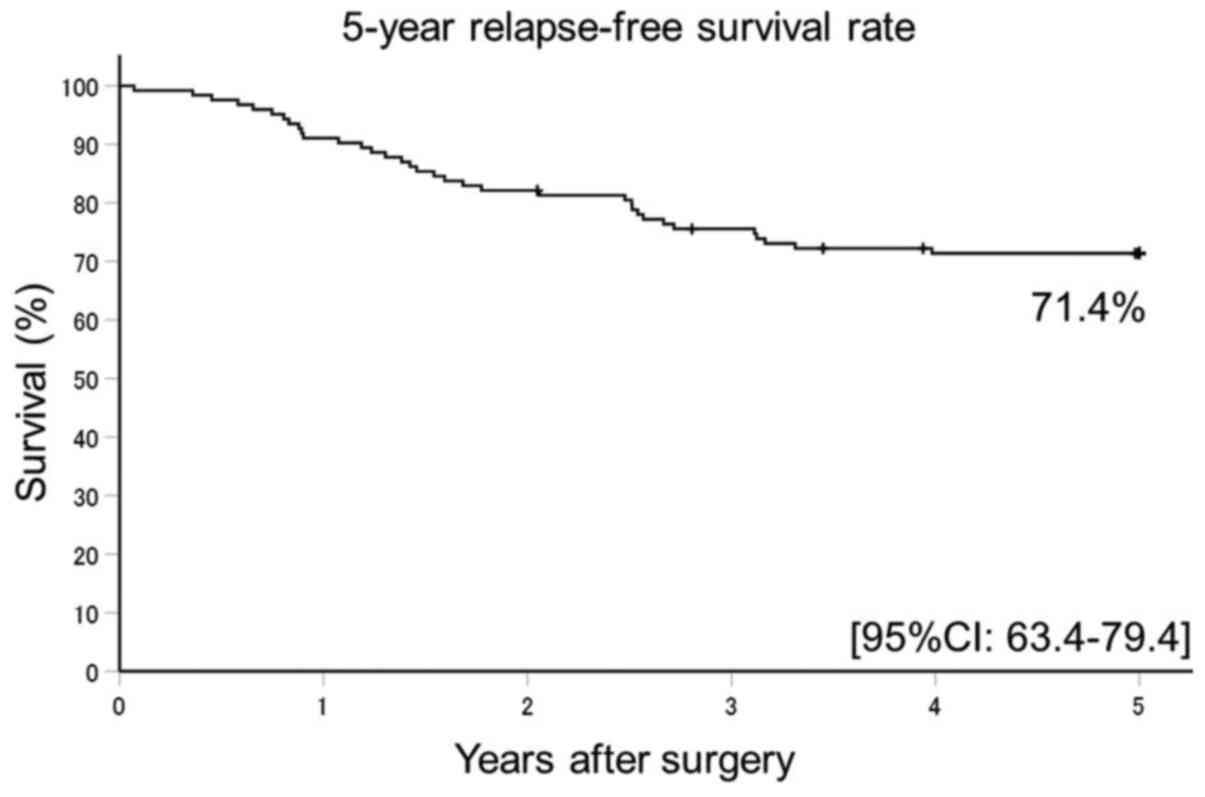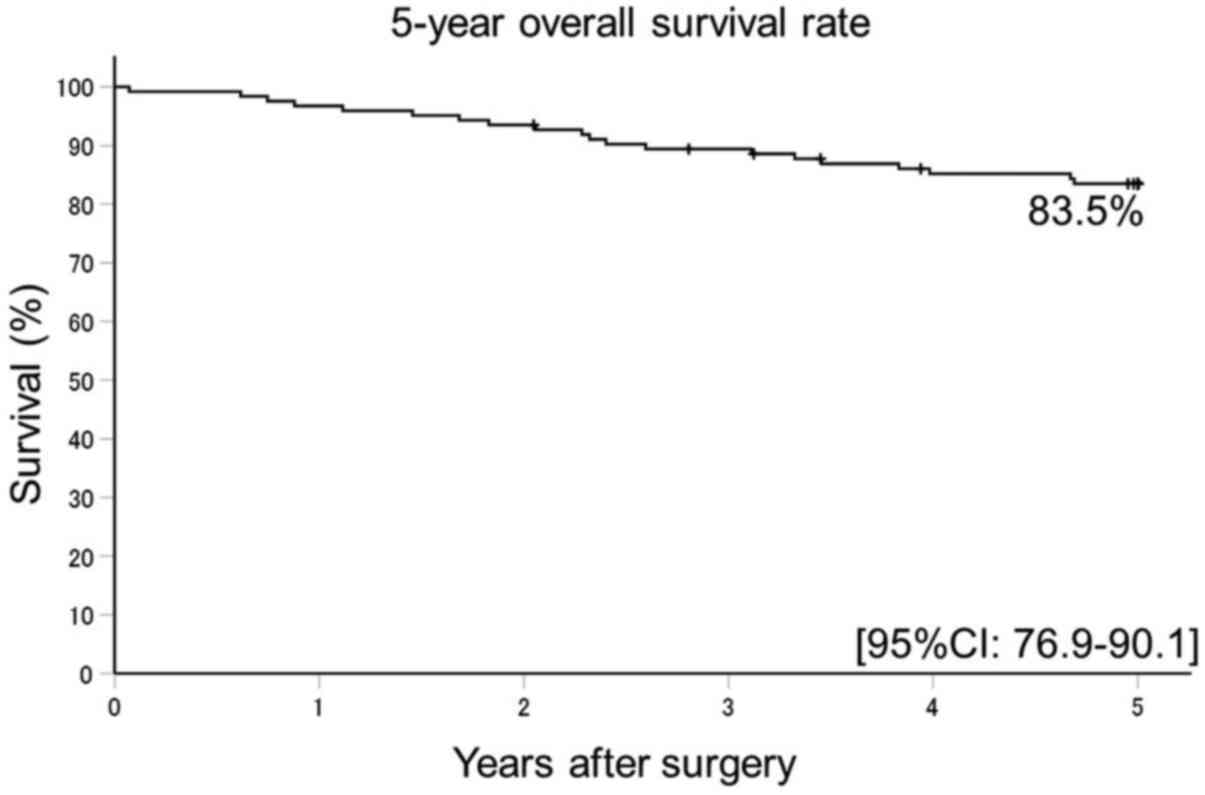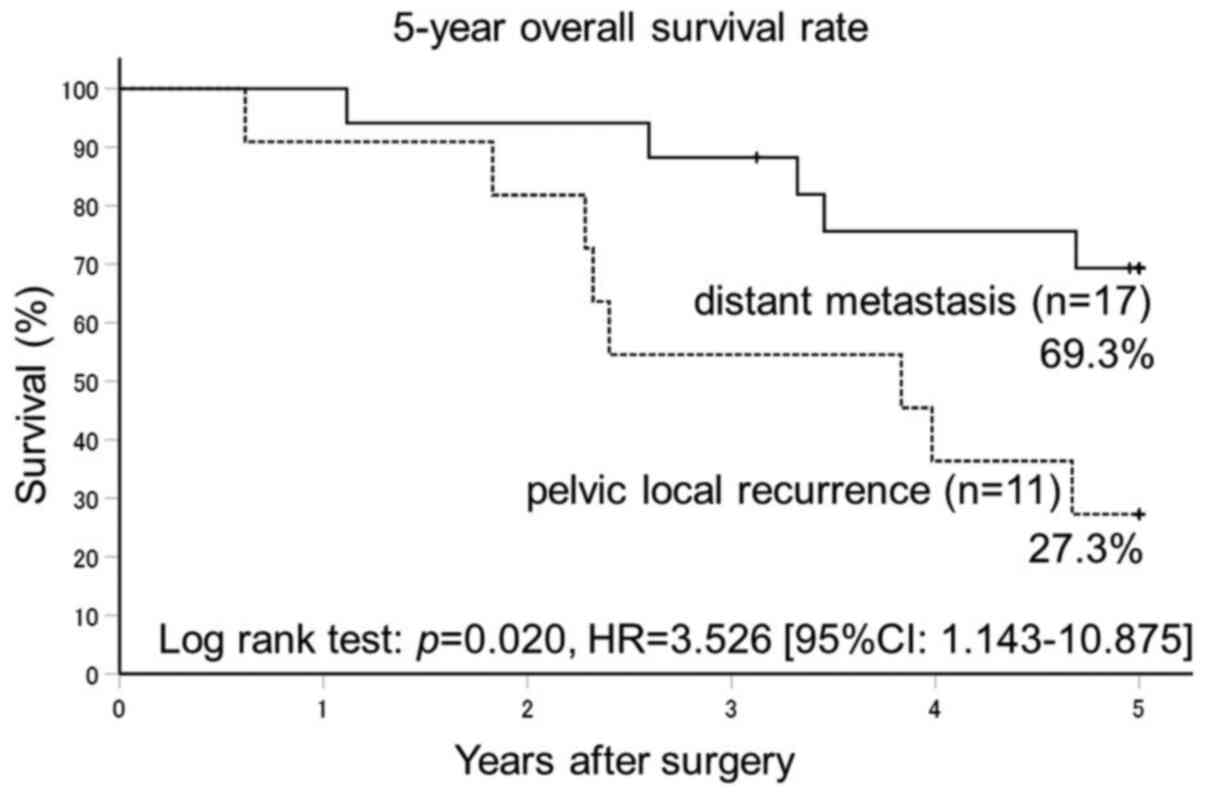|
1
|
Mukai M, Kishima K, Yamazaki M, Aoki H,
Izumi H, Yamamoto S, Tajima T, Tobita K, Sadahiro S, Yasuda S and
Ogoshi K: Stage II/III cancer of the rectosigmoid junction: An
independent tumor type? Oncol Rep. 26:737–741. 2011.PubMed/NCBI View Article : Google Scholar
|
|
2
|
Hashiguchi Y, Muro K, Saito Y, Ito Y,
Ajioka Y, Hamaguchi T, Hasegawa K, Hotta K, Ishida H, Ishiguro M,
et al: Japanese Society for Cancer of the Colon and Rectum(JSCCR)
guidelines 2019 for the treatment of colorectal cancer. Int J Clin
Oncol. 25:1–42. 2019.PubMed/NCBI View Article : Google Scholar
|
|
3
|
Mukai M, Nakamura M, Kishima K, Ninomiya
H, Nomura N, Sato H, Kato N, Machida T, Nakasaki H and Makuuchi H:
Local recurrence and occult neoplastic cells in the extranodal fat
of dissected lymph nodes in patients with curatively resected
primary colorectal cancer. Oncol Rep. 17:1365–1369. 2007.PubMed/NCBI
|
|
4
|
Cammà C, Giunta M, Fiorica F, Pagliaro L,
Craxì A and Cottone M: Preoperative radiotherapy for resectable
rectal cancer. A meta-analysis. JAMA. 284:1008–1015.
2000.PubMed/NCBI View Article : Google Scholar
|
|
5
|
Colorectal Cancer Collaborative Group.
Adjuvant radiotherapy for rectal cancer: A systematic overview of
8,507 patients from 22 randomised trials. Lancet. 358:1291–1304.
2001.PubMed/NCBI View Article : Google Scholar
|
|
6
|
Bosset JF, Collete L, Calais G, Mineur L,
Maingon P, Radosevic-Jelic L, Daban A, Bardet E, Beny A and Ollier
JC: EORTC Radiotherapy Group Trial 22921. Chemotherapy with
preoperative radiotherapy in rectal cancer. N Engl J Med.
355:1114–1123. 2006.PubMed/NCBI View Article : Google Scholar
|
|
7
|
Gérard JP, Conroy T, Bonnetain F, Bouché
O, Chapet O, Closon-Dejardin MT, Untereiner M, Leduc B, Francois E,
Maurel J, et al: Preoperative radiotherapy with or without
concurrent fluorouraciland leucovorin in T3-4 rectal cancers:
Results of FFCD 9203. J Clin Oncol. 24:4620–4625. 2006.PubMed/NCBI View Article : Google Scholar
|
|
8
|
Ozawa H, Kotake K, Hosaka M, Hirata A and
Sugihara K: Impact of lateral pelvic lymph node dissection on the
survival of patients with T3 and T4 low rectal cancer. World J
Surg. 40:1492–1499. 2016.PubMed/NCBI View Article : Google Scholar
|
|
9
|
Kinugasa T, Akagi Y and Shirouzu K:
Benefit of lateral lymph node dissection for rectal cancer:
Long-term analysis of 944 cases undergoing surgery at a single
center (1975-2004). Anticancer Res. 34:4633–4639. 2014.PubMed/NCBI
|
|
10
|
Fujita S, Mizusawa J, Kanemitsu Y, Ito M,
Kinugasa Y, Komori K, Ohue M, Ota M, Akazai Y, Shiozawa M, et al:
Mesorectal excision with or without lateral lymph node dissection
for clinical stage II/III lower rectal cancer (JCOG0212): A
multicenter, randomized controlled, noninferiority trial. Ann Surg.
266:201–207. 2017.PubMed/NCBI View Article : Google Scholar
|
|
11
|
Tsukamoto S, Fujita S, Ota M, Mizusawa J,
Shida D, Kanemitsu Y, Ito M, Shiomi A, Komori K, Ohue M, et al:
Long-term follow-up of the randomized trial of mesorectal excision
with or without lateral lymph node dissection in rectal cancer
(JCOG0212). Br J Surg. 107:586–594. 2020.PubMed/NCBI View Article : Google Scholar
|
|
12
|
Folkesson J, Birgisson H, Pahlman L,
Cedermark B, Glimelius B and Gunnarsson U: Swedish rectal cancer
trial: Long lasting benefits from radiotherapy on survival and
local recurrence rate. J Clin Oncol. 23:5644–5650. 2005.PubMed/NCBI View Article : Google Scholar
|
|
13
|
Mukai M, Tajima T, Nakasaki H, Sato S,
Ogoshi K and Makuuchi H: Efficacy of postoperative adjuvant oral
immunochemotherapy in patients with Dukes' B colorectal cancer. Ann
Cancer Res Ther. 11:201–214. 2003.
|
|
14
|
Lembersky BC, Wieand HS, Petrelli NJ,
O'Connell MJ, Colangelo LH, Smith RE, Seay TE, Giguere JK, Marshall
ME, Jacobs AD, et al: Oral uracil and tegafur plus leucovorin
compared with intravenous fluorouracil and leucovorin in stage II
and III carcinoma of the colon: Results from National Surgical
Adjuvant Breast and Bowel Project Protocol C-06. J Clin Oncol.
24:2059–2064. 2006.PubMed/NCBI View Article : Google Scholar
|
|
15
|
Ito I, Mukai M, Ninomiya H, Kishima K,
Tsuchiya K, Tajima T, Oida Y, Nakamura M and Makuuchi H: Comparison
between intravenous and oral postoperative adjuvant
immunochemotherapy in patients with stage II colorectal cancer.
Oncol Rep. 20:1189–1194. 2008.PubMed/NCBI
|
|
16
|
Mukai M, Okada K, Fukumitsu H, Yazawa N,
Hoshikawa T, Tajima T, Hirakawa H, Ogoshi K and Makuuchi H:
Efficacy of 5-FU/LV plus CPT-11 as first-line adjuvant chemotherapy
for stage IIIa colorectal cancer. Oncol Rep. 22:621–629.
2009.PubMed/NCBI View Article : Google Scholar
|
|
17
|
Japanese Society for Cancer of the Colon
and Rectum. Japanese Classification of Colorectal, Appendiceal, and
Anal Carcinoma. 9th edition. Kanehara Shuppan Co. Ltd., Tokyo,
pp21-27, 2018.
|
|
18
|
Tajima T, Mukai M, Koike T, Yokoyama D,
Uda S, Yoshii H, Higami S, Izumi H, Hasegawa S, Nomura E and
Makuuchi H: Better survival after hand-assisted laparoscopic
surgery than conventional laparotomy for rectal cancer: Five year
results from a single center in Japan. Clin Surg.
2(1368)2017.PubMed/NCBI View Article : Google Scholar
|
|
19
|
Mukai M, Tajima T, Hasegawa S, Yokoyama D,
Koike T, Hiraiwa S, Sugiyama T and Tajiri T: Recent molecular
immunological chemotherapy for gastrointestinal malignancies. Clin
Oncol. 2(1233)2017.
|
|
20
|
Dukes CE: The classification of cancer of
the rectum. J Pathol (Bacteriol). 35:323–332. 1932.
|
|
21
|
Furuhata T, Hata F, Tsuruma T, Nshimori H,
Yamaguchi K, Mizuguchi T, Kimura Y, Katsuramaki T, Mukaiya M,
Sasaki K and Hirata K: Endo-Bowel clamp (PL540S) for safe rectal
irrigation in laparoscopy-assisted rectal resection. Surg Today.
34:882–884. 2004.PubMed/NCBI View Article : Google Scholar
|
|
22
|
Cerny M, Dunet V, Prior JO, Hahnloser D,
Wagner AD, Meuli RA and Schmidt S: Initial staging of locally
advanced rectal cancer and regional lymph nodes comparison of
diffusion-weighted MRI with 18F-FDG-PET/CT. Clin Nucl Med.
41:289–295. 2016.PubMed/NCBI View Article : Google Scholar
|
|
23
|
Fleshman J, Branda M, Sargent DJ, Boller
AM, George V, Abbas M, Peters WR Jr, Maun D, Chang G, Herline A, et
al: Effect of laparoscopic-assisted resection vs open resection of
stage II or III rectal cancer on pathologic outcomes: The ACOSOG
Z6051 randomized clinical trial. JAMA. 314:1346–1355.
2015.PubMed/NCBI View Article : Google Scholar
|
|
24
|
Stevenson AR, Solomon MJ, Lumley JW,
Hewett P, Clouston AD, Gebski VJ, Davies L, Wilson K, Hague W and
Simes J: ALaCaRT Investigators. Effect of laparoscopic-assisted
resection vs. open resection on pathological outcomes in rectal
cancer: The ALaCaRT randomized clinical trial. JAMA. 314:1356–1363.
2015.PubMed/NCBI View Article : Google Scholar
|
|
25
|
Mukai M, Kishima K, Tajima T, Hoshikawa T,
Yazawa N, Fukumitsu H, Okada K, Ogoshi K and Makuuchi H: Efficacy
of hybrid 2-port hand-assisted laparoscopic surgery (Mukai's
operation) in patients with colorectal cancer. Oncol Rep.
22:893–899. 2009.PubMed/NCBI View Article : Google Scholar
|
|
26
|
Tajima T, Mukai M, Yokoyama D, Higami S,
Uda S, Hasegawa S, Nomura E, Sadahiro S, Yasuda S and Makuuchi H:
Comparison of hand-assisted laparoscopic surgery (HALS) and
conventional laparotomy in patients with colorectal cancer: Final
results from a single center. Oncol Lett. 13:4953–4958.
2017.PubMed/NCBI View Article : Google Scholar
|
|
27
|
Kitano S, Inomata M, Mizusawa J, Katayama
H, Watanabe M, Yamamoto S, Ito M, Saito S, Fujii S, Konishi F, et
al: Survival outcomes following laparoscopic versus open D3
dissection for stage II or III colon cancer (JCOG0404): A phase 3,
randomized controlled trial. Lancet Gastroenterol Hepatol.
2:261–268. 2017.PubMed/NCBI View Article : Google Scholar
|

















